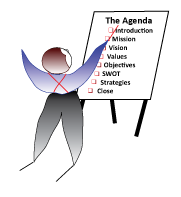March 2007 - The FoCuSeD™ Facilitator eNewsletter

What is a Facilitator? | Gary Rush Facilitation
I had a recent discussion wherein the person I was talking to, began to describe a Facilitator yet ended up describing a teacher using facilitative skills. The person felt it was fine to use one word for two different roles simply because some of the skills overlapped. So what is a Facilitator?
I have been asked, “What is a Facilitator?” I have been a Facilitator since 1983 and I have trained others to be facilitators since 1985 and had to define the role many times. In my early classes, I handed out an article by DeBrabander and Thiers of Belgium called, “Successful Information System Development in Relation to Situational Factors Which Affect Effective Communication between MIS-Users and EDP-Specialists.” Management Science published it in February 1984 and the article defined a Facilitator as a “neutral question elicitor.” I looked over the International Association of Facilitator’s web site for an official definition of a Facilitator but found none. They list the competencies of a Facilitator but not an association-accepted definition. I found a number of definitions in various articles and a list compiled by Sandor Schuman listing 17 definitions from various sources. I found one in the dictionary: one who makes easier. I also found three on Wikipedia, most of which came from the articles in the IAF site. All of the definitions were similar, and none of the definitions made me think of a teacher. On Wikipedia they do list two types – Business Facilitators and Training Facilitators. So, an industry-accepted definition of Facilitator is crucial. It is important when we become Certified Professional Facilitators – that we know what a Facilitator is. That way we don’t become certified professional “whatchamacallits”. As professionals, it helps to know what “it” is. The competencies give us the skills we need to be good at it, but a simple agreed-to definition would be nice. It would also clear up confusion when people ask what it is we do.
Some of the key words and phrases that I found in the definitions of a Facilitator include:
- Enables
- Manages Process and Structure
- Encourages
- Participation
- Supporting Everyone
- Effective Decisions
- Content Neutral
- Group Reaches it’s Goal
- Draw out from Group
What a Facilitator is not. One phrase above eliminates a teacher as a Facilitator – that is content neutral. Neutrality appears in almost every definition and is part of the IAF Facilitator Competencies. I do not want any of my teachers to be content neutral. I want them to know plenty about the subject and teach me. I’m not content neutral when I teach. I do use facilitation skills to teach well, but when I’m a teacher, I’m not a Facilitator. The opposite is also true – when I’m facilitating, I’m not teaching. I use teacher skills when I explain a process, but the content is strictly up to the participants. So I think it is important for us to agree on a definition and call roles what they are by their correct name. It helps avoid confusion and helps those of us who have worked hard to become Certified Professional Facilitators.
My definition of a Facilitator:
A content neutral individual who uses effective processes to enable a group to make effective decisions and accomplish their task while supporting a collaborative and respectful environment that encourages full participation and helps groups overcome barriers to reaching their goal.
Both the International Association of Facilitators (IAF) and the American Society for Training and Development (ASTD) should adopt single definitions for the roles and encourage people to use the words appropriately. We need to call a teacher a teacher and a Facilitator a Facilitator. Both words have a wonderful meaning and both are very honorable. Both roles rely on using skills from the other. We even can be both as an individual, just not at the same time. This way, when someone asks you what you do, and you say, “I’m a facilitator” they will know what you mean. They won’t be wondering and ask what class you teach. ![]()

